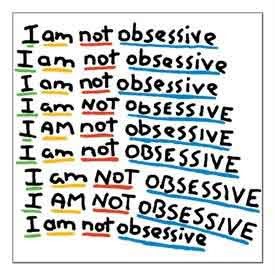Ruminating Can Harm Your Mental Health Recovery

Ruminating can harm your mental health recovery because when you "go over in the mind repeatedly and often casually or slowly" you compulsively remind yourself of what is wrong. It's negative thoughts compounded by repetition and habit, making rumination dangerous. People with depressive and other mental illnesses often have a similar trait: many suffer from excessive and compulsive negative thoughts that distort reality. Thus, rumination involves an endless loop of negative thinking that can exacerbate depression and other mental illnesses.
Rumination and Mental Health Recovery Can't Exist Together
Rumination has been widely described with the illustration of getting a song stuck in your head. You know, the annoying song you really don’t like that much but it keeps coming back to your mind over and over: row, row, row your boat. You're welcome.
It’s important to note that it’s not only the negative thinking but the obsessive replaying in one’s mind of the same negative thoughts over and over again that constitutes rumination.
Research from Yale University has shown the harm rumination can cause. The research found not only can rumination make depression and anxiety worse, it can also lead to binge-drinking and binge-eating, as sufferers attempt to use these negative coping patterns to distract themselves from their obsessive thoughts, according to Susan Nolen-Hoeksema, Ph.D, a psychologist and professor at Yale University.
Many years ago when I was in college, a fellow student said to me, “Man, you think too much.” I dismissed this out of hand. Thinking is a desired and positive aspect of higher learning, therefore, all thinking is good. Unfortunately I hadn’t, at that point, taken a logic class so I was completely unaware that my conclusion was a logical fallacy. How can a person think too much, I reasoned?
It’s because I was focused on thinking as a whole, while my colleague was referencing negative thinking patterns.
And of course, he was right. I did indeed “think too much” with the negative side drowning out the positive side. He didn’t use the word, “rumination,” but that was exactly what he was describing to me. I had a negative thinking pattern that was causing me to become more and more depressed and withdrawn.
How to Fight Rumination and Get Mental Health Recovery on Track
Recognize Rumination
In order for us to fight rumination, we must first be able to recognize and identify our own rumination patterns. This may sound obvious, but when we have developed a habit of thinking we often resort to it subconsciously. It’s important to be able to recognize the rumination pattern in your thinking. You can’t fight something you don’t even realize you are doing.
Challenge Your Ruminations
When we do recognize we’re ruminating again, we must call ourselves out on it. We must find a way to battle the negative thoughts. Often when I find myself in this pattern, I find it helpful to say out loud, “Stop it!”
But stopping isn’t enough. We must also replace these automatic thoughts with ones that are more positive in nature and challenge our own thinking patterns.
David Burns, in his bestselling book “Feeling Good,” refers to this as “verbal judo.” I think of it as being a defendant in a criminal trial.
Put Your Ruminations on Trial
You have the prosecutor (your own mind) leveling accusations against you, and you have your own defense attorney who argues against what the prosecutor is claiming about you. In this case you are both prosecutor and defense attorney. You must vigorously defend your client (yourself) against any and all accusations.
This might seem a little funny at first, pushing back against your own self, but remember, there is a side of you that will destroy you if you don’t take the necessary steps to survive. You will find as you begin to look at these patterns that it becomes easier over time to recognize your ruminations and develop specific arguments against them.
Mental health recovery can be a constant battle with our own self-destructive and negative thoughts. Begin pushing back today so that ruminating doesn't harm your mental health recovery.
APA Reference
Ehrmantrout, M.
(2015, April 15). Ruminating Can Harm Your Mental Health Recovery, HealthyPlace. Retrieved
on 2026, February 4 from https://www.healthyplace.com/blogs/recoveringfrommentalillness/2015/04/ruminating-can-derail-your-mental-health-recovery
Author: Mike Ehrmantrout
May Allah bless you with Peace, Mike.
Im really impressed with this aspect that you've addressed. Ive tried (thanks to Allah) the stop it! technique, and since i have rececntly experienced a stressful ordeal, i dont seem to be ...well stopping.
I know im constantly thinking or returning to this stressful thing, but its passed and well it seems to be on a record player. Please keep my post private, im actively attempting to share my good experiences and tehcniques, and dont want to share this part until i find the tools that provide a solution/can enhance relief and recovery. I am hoping you can help. What can i do, step by step to break its hold? I found the criminal trial part hilarious (as i have lived experience of an "over-inflated critical self") and ive posted this article on my site. Look forward to hearing from you.
